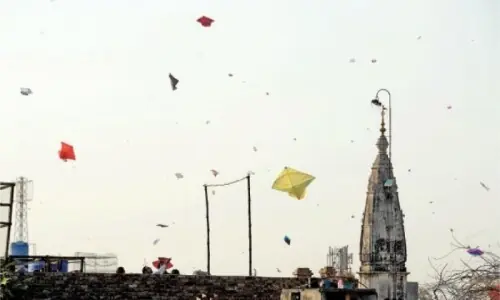ISLAMABAD, Nov 29: The country’s top political and military leaders met on Saturday to discuss the tricky situation resulting from the Indian government’s move to blame “elements within Pakistan” for the Mumbai carnage, but some of the actions and statements in response to Delhi’s tirade were indicative of a growing gulf between the government and the security establishment on ways and means to handle the affair.
The Chief of the Army Staff, Gen Ashfaq Parvez Kayani, had a detailed meeting with President Asif Ali Zardari and Prime Minister Yousuf Raza Gilani. Sources in the government said the discussions came on the heels of the blame game initiated by New Delhi against Islamabad and the latter’s response to the accusations.
Although there was no official word on what actually transpired during the meeting, official and unofficial statements emanating from different quarters of the establishment suggested clear differences in perception, if not on the response to India’s blame game.
Following this meeting of the so-called troika, the prime minister chaired the meeting of his cabinet to formalise the government’s response. And President Asif Zardari took out time to speak to an Indian news channel to assure of Pakistan’s fullest help and support in investigations into the Mumbai carnage.
“As the president of Pakistan let me assure you that if any evidence is found, I will take action against those involved... without hesitation, no matter where it will lead to,” he told Indian journalist Karan Thapar in the interview.
But while sympathising with the people of India, particularly those in Mumbai, President Zardari also appealed to them to go beyond self-interest and work collectively to isolate what he described as “non-state actors” involved in terrorism.
The president also clarified that instead of the director-general of the Inter-Services Intelligence (ISI), a senior official of the agency would be visiting India to hold talks on sharing of evidence. He said if at a later stage a need was felt for a greater cooperation, DGs of the two countries’ intelligence services could also meet to discuss such matters.
The clarification came hours after the government announced on Friday that it had decided to send the ISI chief to Delhi at the Indian prime minister’s request.
Foreign Minister Shah Mehmood Qureshi, while briefing the media on the cabinet meeting and other related developments, also offered cooperation to investigate the matter. Although he did not sound alarming in his comments, he did call upon the Indian side to take effective measures to lower the level of tension.
However, officials of the country’s security establishment smell a rat in the Indian move and the way pressure is being built on Pakistan over the Mumbai issue. A senior security official minced no words in declaring that because of the rising tension, the next 24 to 48 hours were extremely crucial.
He squarely accused India of indulging in the blame game without even investigating the matter and said that at this stage Pakistan’s security establishment was applying methods to avoid what he called an unwanted war.
But at the same time the security officials said if tensions continued to rise, Islamabad might be compelled to shift some of the troops deployed along the border with Afghanistan to the eastern border with India.
Some political and security analysts described the differences in approach and perception to the challenge as nothing unusual. According to them, the fears of Pakistan’s security establishment were because of years of suspicions about the intentions of the Indian authorities to undermine Pakistan.
Lately, they have also been accusing the Indian intelligence of direct or indirect involvement in creating trouble in the tribal regions of Balochistan and the Frontier province.
One of the analysts also pointed to the army’s lack of patience with the handling of such matters by politicians.
Sources in the government say it is quite obvious that President Zardari and the government are quite keen to resolve the matter through dialogue, even if it means going an extra mile in extending cooperation. But the sources acknowledge that this is where the trouble lies, as the security establishment is of the view that certain decisions are being taken without even consulting it.
The undue haste shown in announcing the decision to send the ISI director-general to Delhi at Prime Minister Manmohan Singh’s request is being cited as an example of this lack of communication.
It’s not clear if these are just irritants, or the trust deficit between the political and military leadership on these and other issues is gradually deepening. But according to one security analyst, perhaps the decisions and actions in the next couple of days may help clear up the matter.

































